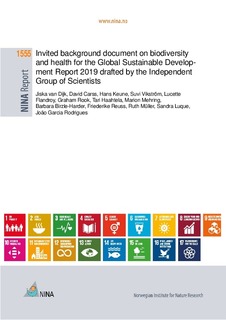Invited background document on biodiversity and health for the Global Sustainable Development Report 2019 drafted by the Independent Group of Scientists
van Dijk, Jiska; Carss, David; Keune, Hans; Vikström, Suvi; Flandroy, Lucette; Rook, Graham; Haahtela, Tari; Mehring, Marion; Birzle-Harder, Barbara; Reuss, Friederike; Müller, Ruth; Luque, Sandra; Garcia Rodrigues, João
Research report
Published version

Åpne
Permanent lenke
http://hdl.handle.net/11250/2616891Utgivelsesdato
2019Metadata
Vis full innførselSamlinger
- NINA Rapport/NINA Report [2307]
Sammendrag
The key findings and key messages from the regional assessment for Europe and Central Asia of the interlinkages between health and biodiversity are given in this background paper, as an overview of the main conclusions in this field. In addition, this paper highlights the links between biodiversity and health at various spatial and temporal scales, further elabo-rated upon in a diversity of cases. These cases, ranging from issues around microbiota, Asian bush mosquitos, forest and marine ecosystems, and biodiversity and health issues at a national scale, emphasise not only the diverse range of ways by which biodiversity can have an impact on health and social well-being, but also the importance of integrating the issue of biodiversity and health into our efforts to meet the Sustainable Development Goals by 2030. The first case on microbial biodiversity is directly linked to human health issues, and is also expected to have implications for the next generation. The current invasion of the Asian bush mosquito in Europe impairs physical health as the mosquito is a vector of vari-ous pathogens. Both forest and marine biodiversity are shown to affect a combination of physical and mental health, as well as social wellbeing and the ‘OneHealth/EcoHealth’ ap-proach is described in the national case from as a transdisciplinary effort to implement ac-tions that promote adaptive health management across human, animal and ecosystem inter-faces. Nøkkelfunnene og -informasjonen fra den regionale vurderingen for Europa og Sentral-Asia av sammenhenger mellom helse og biologisk mangfold er gjengitt i denne bakgrunnsrapporten som en oversikt over nåværende kunnskapsstatus på dette forskningsfeltet. Rapporten gir også de viktigste funnene om sammenhengen mellom biodi-versitet og helse i ulike romlige og tidsmessige skalaer, eksemplifisert i ulike studier. Studi-ene, som spenner fra problemstillinger tilknyttet mikrobiota, asiatiske buskmygg, skogs- og marine økosystemer og biologisk mangfold og helseproblemer på en nasjonal skala, legger ikke bare vekt på den mangfoldige måten som biologisk mangfold kan påvirke helse og so-sial velvære på, men også viktigheten av å integrere problemstillingen i vårt arbeid for å mø-te bærekrafts-målene innen 2030. Studien om mangfoldet av mikrober er direkte tilknyttet helseproblematikk som også vil påvirke senere generasjoner. Den nåværende invasjonen av den asiatiske myggen Aedes japonicus i Europa forringer fysisk helse fordi myggen er en vektor for ulike patogener. Både skogs- og marinbiologisk mangfold påvirker en kombina-sjon av fysisk og psykisk helse, så vel som sosial velvære, og OneHealth/EcoHealth-tilnærmingen er adressert i den nasjonale studien fra Belgia.